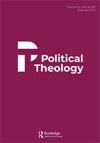Decolonizing Debt: New Fields for Institutions – Response to Mitchell Dean, Andrea Mura and Valentina Napolitano
IF 0.4
0 RELIGION
引用次数: 0
Abstract
The issues raised by Mitchell Dean are fundamental and come from his important work on common research themes. This makes the discussion all the more stimulating. As Dean points out, Debt and Guilt was written at a time when the European Union found itself directly involved in the global financial crisis. The question of debt has therefore become a specific problem for some European nations, which were considered responsible for poor management of the state. In this sense, it was a guilt that was easily attributable and equally easy to position in the context of what could be done to make amends, in the sense of damages that had been caused, a broken rule or a breached agreement, which, however, could be compensated for through making sacrifices. The point for me then was to understand what fueled the supposedly linear logic behind austerity policies. More than an economic issue in the technical sense, the debt problem emerged as a powerful political problem. With the affirmation of neoliberal policies, the market became the dominant political institution. This phenomenon produced a radical transformation in terms of normative production. The function of guilt, linked to the economy of debt, changed with the shifting conditions that produced it. The categories at the heart of this transformation are no longer only those of a juridical nature, which control nation-states. From the moment the market became the dominant political institution, the economic categories connected to the field of valuation were at stake. In this context, guilt is not only the expression of an unmet obligation. Instead, it involves the condition that is produced at the moment when, with neoliberal policies, the way of giving value to life fully match the valorization of capital, thus making it possible for each person to become “human capital” and, therefore, to be (or not be) worthy of the investment expected, and thus finding himself, in this second case, in the condition of one who feels guilty. A profound transformation took place in the capitalist modes of production at the moment when this type of entrepreneurial rationality was extended to all work environments and across the social and political arenas until it affected the entire existences of millions of people, who as individuals became “items of capital” in whom investments could be made. This is why, as Dean argues, the experience of subjectivity occupies “the core of my analysis of the sources of debt and guilt.” Ultimately, the point for me is to understand in what sense it seems possible to say that the methods by which economic power subjugates us are intrinsically connected to the methods with which subjects非殖民化债务:机构的新领域——对米切尔·迪恩、安德烈·穆拉和瓦伦蒂娜·纳波利塔诺的回应
Mitchell Dean提出的问题是根本性的,来自于他在共同研究主题上的重要工作。这使得讨论更加刺激。正如迪恩所指出的,《债务与罪恶》是在欧盟发现自己直接卷入全球金融危机的时候写成的。因此,债务问题已成为一些欧洲国家的一个具体问题,这些国家被认为应对国家管理不善负责。从这个意义上说,这是一种很容易归因的罪行,在可以采取什么措施进行赔偿的背景下,也同样容易定位,在已经造成的损害、违反的规则或违反的协议的意义上,然而,可以通过做出牺牲来补偿。对我来说,当时的重点是了解是什么推动了紧缩政策背后所谓的线性逻辑。债务问题不仅仅是一个技术意义上的经济问题,它还是一个强大的政治问题。随着新自由主义政策的确立,市场成为占主导地位的政治制度。这一现象在规范生产方面产生了根本性的转变。与债务经济相关的犯罪功能随着产生它的条件的变化而改变。这种转变的核心类别不再只是控制民族国家的司法性质的类别。从市场成为主导政治机构的那一刻起,与估值领域相关的经济类别就岌岌可危。在这种情况下,有罪不仅仅是未履行义务的表现。相反,它涉及到在新自由主义政策下,赋予生命价值的方式与资本的价值化完全匹配的时刻所产生的条件,从而使每个人都有可能成为“人力资本”,因此,有可能(或不配)获得预期的投资,从而在第二种情况下,发现自己处于有罪的状态。资本主义生产方式发生了深刻的转变,当时这种创业理性被扩展到所有工作环境以及整个社会和政治舞台,直到它影响到数百万人的整个存在,他们作为个人成为了可以进行投资的“资本项目”。这就是为什么,正如迪恩所说,主体性体验占据了“我对债务和内疚来源分析的核心”。最终,我的重点是理解,在什么意义上可以说,经济力量征服我们的方法与主体的方法有着内在的联系
本文章由计算机程序翻译,如有差异,请以英文原文为准。
求助全文
约1分钟内获得全文
求助全文

 求助内容:
求助内容: 应助结果提醒方式:
应助结果提醒方式:


